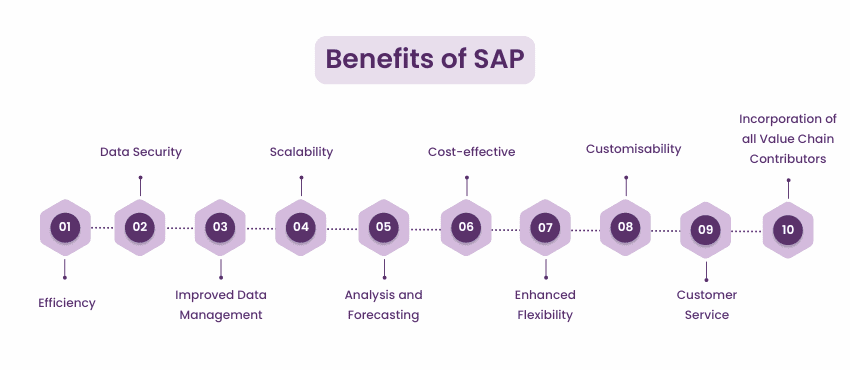Introduction
Artificial Intelligence (AI) has emerged as a transformative force across industries, and SAP management is no exception. With its advanced analytics, machine learning, and automation capabilities, AI is redefining how businesses manage their SAP systems. From streamlining operations to improving decision-making, AI integrates seamlessly with SAP modules, enhancing efficiency and agility.
1. What is AI in SAP Management?
The use of artificial intelligence technologies and methodologies to optimize and improve SAP system performance is referred to as AI in SAP management. This comprises:
- Predictive Analytics: Predictive analytics is the process of predicting patterns and seeing possible problems before they arise.
- Process Automation: Process automation is the process of saving time and money by automating repetitive operations.
- Decision Support: Facilitating data-driven insights to improve decision-making
2. Key Applications of AI in SAP Management
a. Predictive Maintenance
In order to anticipate any breakdowns and guarantee timely maintenance, AI algorithms examine system logs and performance measurements.
- minimizes unscheduled downtime.
- improves the dependability of the system.
b. Intelligent Automation
AI-powered bots are used to automate repetitive operations like data entry and report generating.
- Finance and HR modules can be automated with the use of tools like SAP Intelligent RPA.
c. Enhanced Data Analytics
AI tools such as SAP Analytics Cloud offer deeper insights.
- Recognize opportunities, trends, and anomalies instantly.
- Produce precise projections for strategic planning.
d. Personalized User Experience
AI-powered chatbots, such as SAP Conversational AI, provide users with individualized support.
- Reduce reliance on support personnel and speed up response times.
e. Fraud Detection and Compliance
Artificial intelligence (AI) systems keep an eye on transactions for questionable trends and guarantee legal compliance.
- Reduce the threats to your finances and reputation.
f. Supply Chain Optimization
AI optimizes inventory management and forecasts demand trends.
- Cut expenses and increase operational efficiency.
3. Benefits of AI in SAP Management

a. Improved Efficiency
AI makes resources available for more strategic endeavors by automating repetitive jobs and procedures.
b. Cost Savings
Significant cost savings result from better resource allocation and fewer mistakes.
c. Real-Time Insights
Real-time data processing using AI allows for faster and better decision-making.
d. Enhanced Accuracy
By reducing human mistake, AI guarantees data consistency and accuracy across systems.
e. Competitive Advantage
Businesses that use AI in SAP are able to innovate and adapt, which gives them a strategic advantage.
4. AI-Powered Tools in SAP
a. SAP AI Business Services
For integration with SAP modules, SAP offers pre-trained AI services including image recognition, natural language processing, and predictive analytics.
b. SAP Conversational AI
Workflows are automated and intelligent user contact is made possible by this chatbot platform.
c. SAP Intelligent RPA
Throughout the SAP landscape, SAP Intelligent Robotic Process Automation automates repetitive processes.
d. SAP Leonardo
An innovation platform for SAP systems that integrates blockchain, AI, IoT, and machine learning.
5. AI in Key SAP Modules
a. SAP S/4HANA
- predictive tools for financial analysis and planning.
- automated procurement-to-pay and order-to-cash procedures.
b. SAP SuccessFactors
- AI-powered talent acquisition recruitment solutions from SAP SuccessFactors.
- Sentiment analysis for engagement and employee feedback.
c. SAP Ariba
- Supplier risk evaluations powered by SAP Ariba AI.
- automated procedures for procurement.
d. SAP Customer Experience (CX)
- AI improves targeted marketing and client segmentation.
- Sales forecasting is enhanced with predictive analytics.
6. Challenges in Adopting AI in SAP Management
a. Data Quality Issues
For AI to produce reliable findings, high-quality data is necessary. AI’s efficacy may be hampered by inadequate data handling.
Solution: Make sure data consistency is maintained and put strong data governance standards into place.
b. Integration Complexities
It might be difficult and time-consuming to integrate AI tools with current SAP systems.
Solution: For smooth integration, make use of SAP’s built-in AI capabilities.
c. Skill Gaps
Adoption may be delayed by a lack of knowledge about SAP and AI technology.
Solution: Work with seasoned service providers and make training investments for staff.
d. Security Concerns
AI apps need to be protected to avoid illegal access and data breaches.
Solution: Implement access controls, encryption, and frequent security audits.
7. Future of AI in SAP Management
a. Autonomous Systems
The development of self-healing and self-optimizing SAP systems will be fueled by AI.
b. AI and IoT Integration
Supply chain visibility and operational efficiency will be improved by integrating AI and IoT in SAP systems.
c. Advanced Predictive Analytics
Even more accurate forecasting and risk management across SAP landscapes will be made possible by AI.
d. Sustainability Initiatives
Through waste reduction and resource optimization in SAP-enabled operations, AI may help achieve sustainability goals.
8. Case Studies: AI Transforming SAP Management
Case Study 1: Retail Industry
Retail Sector
SAP AI Business Services was utilized by a multinational retailer to enhance inventory management and analyze customer data. As a result, stock-outs decreased by 20%, and customer satisfaction increased.
Case Study 2: Manufacturing Sector
By using SAP Intelligent RPA to automate order processing, a manufacturing company was able to increase process speed and reduce manual errors by 40%.
9. Best Practices for Implementing AI in SAP Management
a. Define Clear Objectives
Align the application of AI with certain business objectives and difficulties.
b. Start Small and Scale
Before implementing AI widely, start with trial projects to gauge its effects.
c. Collaborate Across Teams
To match AI initiatives with organizational goals, make sure the business and IT teams are working together.
d. Monitor and Optimize
Regularly evaluate the efficacy of AI applications and make the required modifications.
10. Getting Started with AI in SAP Management
a. Evaluate Current SAP Landscape
Determine the areas, such automating monotonous operations or enhancing analytics, where AI can make the biggest difference.
b. Leverage SAP AI Tools
Make use of SAP’s AI tools for smoother integration and quicker deployment.
c. Partner with Experts
Work together with AI service providers and SAP consultants to manage complexity and optimize outcomes.
Conclusion
- AI is transforming SAP management through increased productivity, better decision-making, and the facilitation of proactive tactics. For companies looking to prosper in a cutthroat market, artificial intelligence (AI) is revolutionizing everything from intelligent automation to predictive analytics.
- Organizations may optimize their operations and future-proof their systems for further growth and innovation by integrating AI into SAP management.
YOU MAY BE INTERESTED IN
Is SAP ABAP a High Paying Job?





